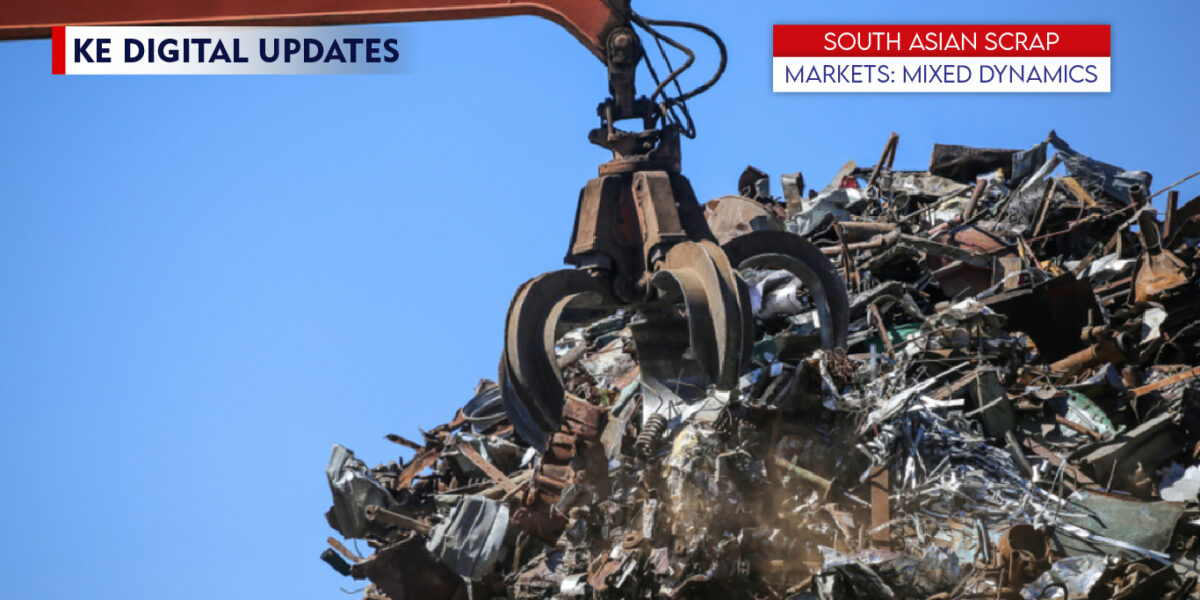Published on January 9, 2025
The scrap markets in South Asia are currently exhibiting a complex landscape characterized by mixed dynamics across different countries. Factors such as currency fluctuations, domestic demand, and regional supply variations influence pricing and trading activities, leading to diverse market conditions in India, Pakistan, Bangladesh, and Turkey.
India:
India’s ferrous scrap market has faced notable sluggishness recently. Buyers are increasingly focusing on domestic procurement due to a pronounced bid-offer mismatch, primarily exacerbated by the depreciation of the Indian rupee. This depreciation has made imports less viable, raising costs for traders and leading to minimal trading activity.
Indicative offers from international markets, particularly from the US and UK/Europe, were recorded at approximately $385 per ton on a CFR (Cost and Freight) basis at Nhava Sheva. However, buyer interest remains constrained, with many stakeholders hesitant to engage at these price levels.
A strong dollar and unfavorable domestic conditions have resulted in a market where trades are few and far between. As one trader noted, the disconnection between asking prices and buyer expectations has led to a lack of responsiveness, effectively drying up deal flow.
Pakistan:
In Pakistan, the imported scrap market is similarly muted. Mills are operating at reduced capacities, translating into a cautious approach to purchasing. Buyers in Pakistan are actively searching for lower prices, leading to limited trading activity.
Current offers for UK-origin shredded scrap were reported between $388 and $390 per ton CFR at Qasim. However, suppliers resist further price reductions, resulting in a standoff between buyers and sellers. This situation is compounded by the seasonal factors that typically influence post-holiday market dynamics, contributing to the subdued atmosphere.
Domestic rebar prices have slightly increased, but the overall demand for scrap remains tepid. Mills are grappling with challenges, including reduced demand and the pressure of firm European offers that do not align with current buyer expectations.
Bangladesh:
Contrasting sharply with its neighbors, Bangladesh has witnessed a surge in imported scrap demand. This uptick is primarily driven by a domestic shortage of scrap coupled with an increase in rebar sales. Many mills have raised rebar prices significantly, indicating robust demand for construction materials.
The indicative price for UK-origin shredded scrap in Bangladesh is around $391 per ton CFR at Chattogram, reflecting a modest decrease of $2 per ton day-over-day. The active trading environment has finalized several import deals, showcasing this market segment’s resilience. Steel mill officials attribute the price hikes to local scrap shortages, with daily rebar sales reaching between 500 and 600 tons. However, despite the positive momentum, the market remains vigilant due to concerns over potential volatility.
Turkey:
Turkey’s scrap market continues to soften, driven by subdued demand from mills. The pressure on sellers to lower prices has intensified, with recent offers for US-origin HMS (Heavy Melting Steel) recorded at $343 per ton CFR, a decrease of $3 per ton from previous levels.
This downward trend reflects a broader market struggle where limited demand and unsold cargoes have forced buyers and sellers into a challenging pricing dynamic. European recyclers face similar pressures, creating a complex environment for international trade in scrap materials.
Conclusion
The South Asian scrap markets are navigating a landscape marked by significant variation across regions. While Bangladesh showcases growth due to increased domestic demand, India and Pakistan grapple with sluggish markets influenced by currency fluctuations and reduced trading activity. In Turkey, the softening market conditions highlight the challenges subdued demand poses. As these dynamics unfold, stakeholders in the scrap industry must remain agile to adapt to the ever-changing market conditions.


